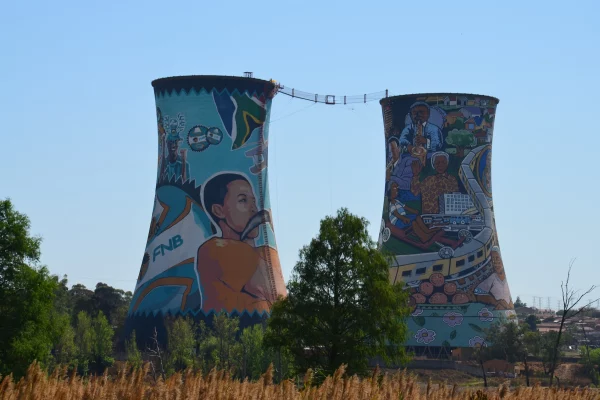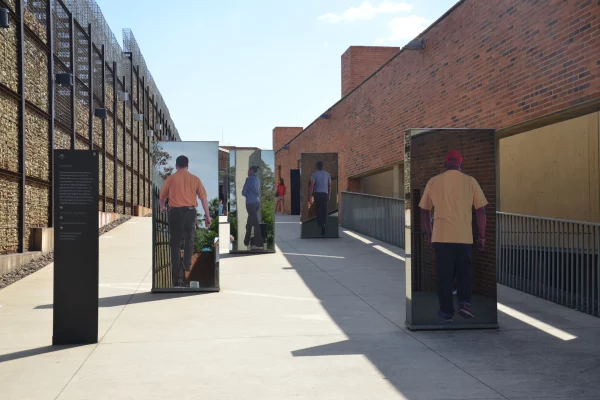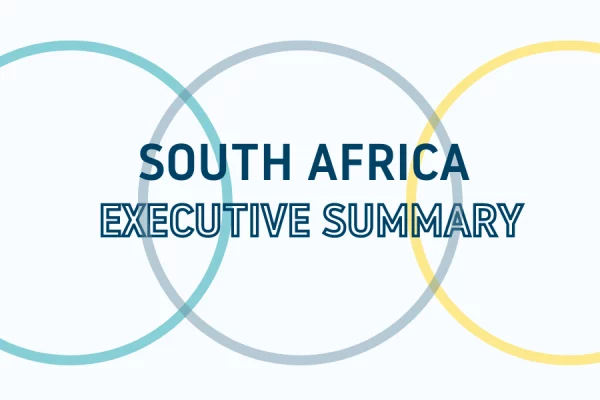South Africa
In straddling a path towards reconciliation and one of renewed racial violence, South Africa has struggled to fully reconcile with its past.
02.06.2023
Assessed Groups
- Race
- Indigeneity
- Ethnicity
- Nationality
In 1994, South Africa transitioned from apartheid to democracy. Apartheid is a system of institutionalized racial segregation and its history continues to impact South Africa today. Despite significant progress in addressing apartheid’s injustices, South Africa still faces challenges in achieving pluralism, particularly due to economic inequality, racial tensions and anti-immigrant sentiment. Known as the ‘Rainbow Nation’, South Africa struggles with, on one hand celebrating diversity but on the other hand, exhibits a form of nationalism that is highly racialized and signals a troubling way forward for the nation. The Monitor Report highlights this tension between ongoing work toward a more pluralistic society and growing anti-immigration sentiments, rising gender-based violence (GBV) and low feelings of national belonging and acceptance. This assessment was completed in 2022.
Takeaways
Racial Inequities and the Rainbow Nation
Known as a ‘Rainbow Nation’ that celebrates diversity compared to its apartheid past, South Africa has yet to fully bring this name to fruition. With economic inequalities growing, an underrepresentation of individuals who are Black women, poor, rural and vernacular speaking in the media and the private sector and prejudice in employment on the basis of race and nationality are on the rise.
Anti-immigrant sentiment fueled by political narratives is leading to conflict and fatalities, with surveys showing deep anti-foreigner feelings across race and class. Although South Africa shows numerous movements toward reconciling with its past, apartheid and colonial attitudes still seep into perceptions of inclusion and acceptance.
Traditional Councils and Customary Law Threaten Citizenship Rights
In 2020, South Africa adopted the Khoi-Sans Leadership Act which recognized Indigenous Khoi-San communities, leaders and more broadly Indigenous rights. Despite this positive movement toward recognizing rights, the act perpetuates authoritarian indirect rule of the apartheid era due to maintaining boundaries and concentrating power in unelected traditional leaders.
As a result, rural black people living under traditional councils are denied certain citizenship rights, particularly women.
Desperate for Change
In moving from its apartheid past, South Africa has actively sought changed and institutionalized numerous liberal and socio-economic rights into its constitution. In doing so, discrimination against all individuals in South Africa is clearly outlawed on the basis of Indigeneity, ethnicity, race and gender with the aim of ridding the country of apartheid’s lingering effects.
Despite these monumental shifts in South Africa’s national commitments, the country still struggles with implementation. Across the population, South Africans show an extremely low level of institutional trust. With growing poverty rates and ethnic divides, 67 percent of South Africans identified as willing to give up elections in exchange for a nonelected government that could provide security, housing and jobs. As a country that historically experienced violent repression during the apartheid regime, this statistic demonstrates the desperation many feel for a change that goes beyond constitutional commitments.
Drivers of Pluralism in South Africa
These best practices are driving and enhancing pluralism in South Africa
Pluralistic Constitution
The Constitution includes a unique combination of political and socioeconomic rights, and an emphasis on human dignity alongside the rights to freedom and equality.
Vibrant Civil Society
CSOs play a vital role challenging discrimination, repression, anti-democratic policies, state failures, corruption and abuse of power by elected and public officials.
Inclusive Media
Government agencies work to guarantee the inclusion of historically disadvantaged communities, languages and cultural groups in the media, who are typically absent from these spaces.
Recommendations
Sanctions, access to justice, and institutional frameworks
To further promote a healthy economy and economically viable citizenry, South Africa can implement sanctions against the lack of economic transformation in the private sector and can work toward rebalancing the private sector’s role so that it is not just seen as a capitalist investor and lender but also as an active participant in training and promoting Africans into management and executive levels of the private sector.
To expand citizen’s capacity and understanding of South Africa’s laws and their access to justice, the government can promote greater awareness amongst victims and minority communities. A key aspect of this work is supporting organizations working on justice, democracy and human rights and their participation in the construction of peace in South Africa. Moreover, the government can work towards developing an even stronger focus on the practical implementation of existing institutional frameworks and laws, including differentiated protection mechanisms for women.
Reduce gender and racial inequalities
South Africa has the opportunity to actively expand policies that improve gender and racial equalities, including measures to alleviate inequality and poverty among coloured communities.
This could include improved and transparent data collection on socio-economic inequality and immigration, as well as publicly condemning xenophobic attacks and mismanagement of immigration.
Indigenous Representation
To further its commitment to equality, South Africa can commit more resources and make a more concerted effort towards the representation of Indigenous communities and promoting their culture and concerns, including redefining inclusive citizenship to actively include and promote Indigenous communities.
It is equally important to ensure that Indigenous communities are formally incorporated into both regional and national planning, so that these groups can articulate and implement their different needs, as is their constitutional right.

Scores
Legal Commitments
International Commitments
Average score: 7
South Africa has ratified several international agreements that aim to address discrimination and exclusion in societies. In recent years, South Africa was applauded for its tenacity in promoting women’s rights due to its implementation of the Convention on the Elimination of All Forms of Discrimination Against Women (CEDAW). However, a concern arises due to South Africa’s lack of action on adhering to these international agreement’s reporting requirements.
National Commitments
Average score: 8
South Africa’s Constitution has provisions that include and offer redress for its colonial and apartheid past as well as protections toward equality, freedom and human dignity. The Constitution has made concerted efforts to remedy the country of the intergenerational effects of segregation caused by apartheid and openly condemns discrimination across many diversity types. Still, the Global Centre for Pluralism’s Monitor report highlights that more work is needed to create a decisive break with the colonial and apartheid system. This is primarily due to its bifurcated legal system that impacts many Black rural people living under traditional leadership where they lack their full civil rights. More recently, the 2017 amendment to the Refugee Act restricts access to asylum and denies substantive rights to refugees, possibly violating the Constitution and international obligations.
Inclusive Citizenship
Average score: 5.5
The South African Citizenship Act of 1995 governs citizenship, while the Constitution grants socio-economic rights to all persons, including non-citizens. However, increasing residency requirements for citizenship exclude foreign nationals and impact their access to health care and education. Still, South Africa has taken important steps in recognizing the rights of Indigenous people, such as through the 2020 Traditional and Khoi-San Leadership Act. This act gives traditional leaders control over natural resources without requiring consulting communities, denying inhabitants their property and citizenship rights
Practices
Policy Implementation
Average score: 5
Despite positive policies aimed at redressing inequalities caused by colonialism and apartheid, South Africa struggles with implementation. Importantly, the Monitor report highlights that education and health care continue to reflect colonial and apartheid inequalities, particularly in rural and poorer areas where a substantial ‘race gap’ exists in access to resources. Basic service delivery is also affected with the majority of municipals ranging from ‘at risk’ to ‘dysfunctional’. To better support policy implementation, numerous institutions have taken steps to hold the government accountable and push toward greater accessibility and functionality.
Data Collection
Average score: 5.5
Statistics South Africa is the main data collection institution gathering data on various themes, including the National Census for population demographics and socio-economic dynamics. Budget cuts have adversely affected its capabilities, and greater consistency between data generated by government systems and external agencies is needed. The COVID-19 pandemic highlighted the difficulty in assessing social assistance needs during the lockdown.
Claims-Making and Contestation
Average score: 6
South Africa’s Constitution protects citizens’ claims-making and encourages it through mechanisms like the Constitutional Court and Chapter 9 institutions. Parliament and state departments enable citizen participation in policy and law-making. The country is protest-intensive, with protests mainly focussed on poor service delivery, governance failures and corruption. Additionally, they are increasingly becoming more violent often due to political, ethnic and xenophobic mobilization that draws on socio-economic exclusion. Claims-making is not accessible to all individuals. Foreign nationals and migrants often face a negative political climate where their rights are not fully protected.
Leadership for Pluralism
Political Parties
Average score: 5
Since moving towards a democratic system, South Africa witnessed a significant increase in its number of political parties and political participation. The governing ANC has experienced a decline in electoral dominance since 2004, and politicians have increasingly used populism and mobilized race, ethnicity, nationality and gender for political ends. This has resulted in political polarization and the rise of parties like the Economic Freedom Fighters, Freedom Front Plus and the Democratic Alliance.
News Media: Representation
Average score: 5.5
South Africa has news and entertainment media available in all official languages and sign language. The media often caters primarily to the English-speaking elite and middle class, resulting in news coverage that mainly focuses on urban centers and excludes poor, young and those who speak dialects in South Africa.
News Media: Prominence of Pluralistic Actors
Average score: 5.5
Commercial media in South Africa is becoming more reflective of the population’s demographic since 1994, with strong representation of Black Africans and women. However, women, particularly Black women, are underrepresented in management positions and ownership. Investigative journalism is under threat by governing and opposition parties, which limits the media’s ability to report diverse concerns that are critical of the state.
Civil Society
Average score: 8
Civil society in South Africa, including NGOs and NPOs, advocate for human rights and challenge discrimination, corruption and abuse of power. They provide services, funding, research and advocacy for marginalized groups. However, they face political will and funding challenges. Notable groups include the Rural Women’s Movement, Land Access Movement, and AfriForum. Successes are met with hostility from government officials.
Private Sector
Average score: 5
The private sector in South Africa accounts for 50-70% of the economy but falls short in reflecting national demographics and correcting inequalities. Despite laws addressing fair and equal labor, progress in ownership of publicly traded enterprises is inadequate. Unemployment rates are high, particularly for Black South Africans, and women are overrepresented in the informal sector. Management positions are largely held by white and Indian men.
Group-based inequalities
Political
Average score: 6
The South African Bill of Rights guarantees freedom of association, political participation and fair elections. The electoral system uses proportional representation and bans parties from excluding members based on categories cited in the Bill of Rights. While mobilization still occurs on ethnic, Indigenous and racial grounds, transparency and public participation are required in legislative processes. Women’s representation has increased, but they still experience discrimination and violence, while non-nationals face political exclusion and xenophobic sentiment from both ruling and opposition parties.
Economic
Average score: 3.5
South Africa has extreme income inequality, with the top 10 percent owning more than 85 percent of household wealth and the bottom 50 percent having negative wealth. Despite the emergence of a Black economic elite, expenditure share for Black Africans remains small, while white expenditure remains disproportionately large. This inequality has not improved since the end of apartheid, and women, migrants and Indigenous communities are disproportionately affected.
Social
Average score: 5
South Africa’s Bill of Rights contains numerous obligations of the state to provide access to public goods, such as housing, health care, food, and social security. However, social inequalities continue to persist and are often gendered and racialized. While a large amount of the nation’s budget is spent on education, health care and welfare, South Africa is not seeing the positive results it expects with this level of funding. Often, poor and rural communities, who are primarily Black, are the most affected. Non-legal nationals and migrant populations also face barriers to accessing social rights and services, while inequalities persist based on race, nationality and indigeneity.
Cultural
Average score: 6
South Africa is a culturally diverse country with 11 official languages and a Constitution that safeguards cultural, linguistic and religious rights. English is dominant in public discourse which highlights concerns about the colonial legacy of a non-Indigenous language becoming an official language in South Africa. As a result, it limits social participation for non-English speakers and perpetuates a hierarchy of languages in the country. Xenophobia and cultural superiority towards foreigners remain problems with discrimination based on nationality still ongoing.
Access to justice
Average score: 5
South Africa’s constitution outlines the judiciary’s independence, separation of powers, specialized courts and alternative dispute resolution mechanisms. In recent years, the judiciary system has focussed on increasing the criminal justice processes’ efficiency and effectiveness. However, the system struggles with overcrowding with a high proportion of prisoners awaiting trial for socio-economic crimes. It also suffers from lack of trust, with a recent Afrobarometer Survey indicating that a slight majority of South Africans indicate little or no trust in the judiciary. Non-nationals are also typically disadvantaged as they struggle to access their judicial rights and often face human rights abuses, torture and denial of legal representation. GBV also remains under prosecuted and plagues South Africa.
Intergroup relations and belonging
Intergroup violence
Average score: 5
South Africa has one of the highest crime rates in the world. The 2019 South African Reconciliation Barometer reported that xenophobic and prejudice based on race and nationality prevalent across the country. Violent crimes such as murder and rape as well as violence against women and African migrants remain issues, with migrants often presented as threats to the country’s safety and security. Feelings of safety or lack of safety are highly linked with socio-economic and power dynamics in society, which impact both social cohesion and reconciliation.
Intergroup trust
Average score: 4
The most recent Afrobarometer survey shows that over 60% of South Africans do not trust people from other ethnic groups. However, the majority (50.8%) don’t mind if their family members marry someone from another ethnic group. Education levels affect intergroup trust, with higher education leading to greater trust. The Gauteng City-Region Observatory (GCRO) report highlights that while the lack of intergroup trust is troubling, it appears to be slowly increasing, particularly with trust amongst neighbors. Despite this improvement, the Afrobarometer still noted that a significant portion of South Africans hold xenophobic positions about people from other African countries living in South Africa, demonstrating a lapse in intergroup trust.
Trust in institutions
Average score: 5
Public trust in institutions in South Africa is declining rapidly due to corruption, poor public services and unequal treatment. The Afrobarometer reveals that trust in the president and ruling parties is very low, but trust in media broadcasters and the Department of Health is higher. Trust in public institutions is at an all-time low and declining, with only 38% trusting the president and 43% trusting the courts. Two-thirds of South Africans would be willing to give up elections for a non-elected government that could provide security, housing and jobs.
Inclusion and acceptance
Average score: 4.5
A Statistics South Africa study found that citizens on average express feelings of inclusivity, with men reporting stronger ties than women. South African women with no formal education reported higher levels of inclusivity compared to those with secondary education. Meanwhile, Afrobarometer revealed that 12% of South Africans have experienced gender-based discrimination in the previous year. The GCRO report showed that younger and Black African respondents were more likely to be categorized as excluded or somewhat excluded. Trust in people of other ethnic groups is low, with over 60% reporting very little or no trust at all.
Shared ownership of society
Average score: 4
The for South Africa demonstrates that a large percentage of respondents feel a strong sense of belonging to the country, especially Black Africans and coloured participants. However, the report notes a lack of ownership and sense of belonging among non-South Africans and indigenous communities. Protests demanding greater recognition and improved service delivery highlight the sense of marginalization of indigenous communities and the lack of ownership they feel.


